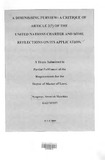| dc.description.abstract | The aim of this thesis is to explore the history of the 'domestic jurisdiction clause' of the United Nations Charter whose essence is to prohibit the United Nations from intervening in matters which are essentially within the domestic jurisdiction of any state, and to consider the relevance and utility of the Article. The first Part of the thesis is a historical analysis and anatomical dissection of Article 2(7) aiming at ascertaining the meaning and scope intended by the originators of this complex and mysterious Article. The Article leaves open to controversy, questions pertaining to what the term intervene encompasses.
The thesis investigates the exact scope of the prohibition as well as the enduring disputation on what is meant by 'matters essentially within the domestic jurisdiction.' It also forays into the inescapable question of the authority vested with the competence to make a determination whether or not Article 2(7) has been violated. The discussion of these questions in the first Part of the thesis sets necessary stage for the second Part of the thesis. The second Part of the thesis explores how the Article has been applied to address contemporary questions confronting the world. In so doing, recourse is had to the history of the drafting of the United Nations Charter and the writings and commentaries of scholars thereon, as well as the practice of the United Nations across the years. Particular attention is focused on the conduct of the international financial institutions, which are specialized agencies of the United Nations.
The thesis scrutinizes the interaction of these institutions with the members of the United Nations, particularly those from the Third World, vis- a-vis the prohibitions of Article 2(7). This Part also considers a growing and disturbing trend of intervention by stronger states against weaker ones in circumstances that threaten to render Article 2(7); indeed the entire Charter, irrelevant. Ultimately, the thesis makes an assessment of the continued relevance and efficacy of Article 2(7) today and proposes the way forward in addressing the problems raised by the Article. The conclusion is drawn that whatever may have been the intentions of the drafters of the Charter, the purview of Article 2(7) has considerably diminished and the Article continues to be under assail thanks to the advent of globalization. The thesis urges another look at Article 2(7) that benefits from hindsight and that is alive to the contemporary realities of international law and politics. | en_US |

